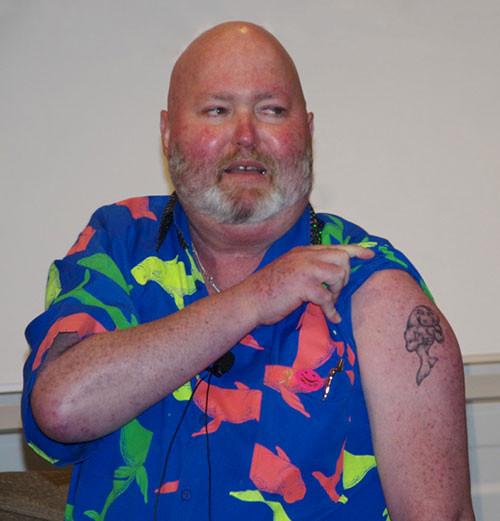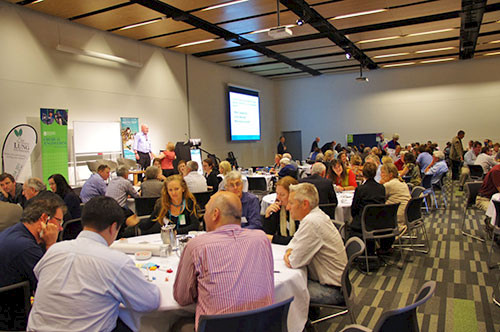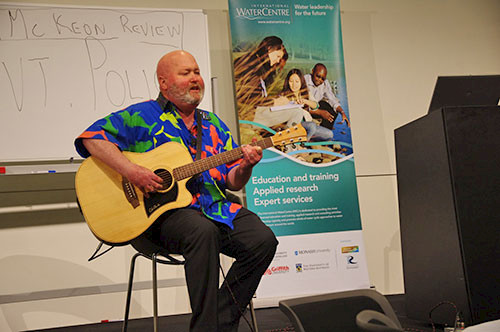Peter Oliver's retirement sermon; Greek philosophers, jelly babies, wicked problems and dugongs
Bill Dennison ·Peter Oliver gave his final lecture entitled "Effectively communicating wicked problems--emotion, ethics, action and those funny little things called facts" at the Brisbane Convention and Exhibition Centre. The lecture was originally scheduled to be held at the University of Queensland, but the interest was too high and Peter's desire was to have people seated at tables to facilitate a workshop that was embedded into the lecture, so the venue was moved to accommodate the crowd of about one hundred and fifty participants, including colleagues from academia and the International WaterCentre. A busload of people came from Maleny which included Peter's friends and family. Through the audience and photographs, we saw the many faces of Peter Oliver, including school teacher, outdoor educator, singer/songwriter, traveler, philosopher and family man.

The lecture discussed concepts introduced by Greek philosophers. Various Greek words were used to explain the evolution of science. The terms Sofia (wisdom) and Nous (that which is known but cannot be explained) were used to describe historical scientific knowledge. The terms Techne (applying knowledge) and Episteme (systems of knowledge) were used to describe modern science. And the terms Phronesis (intersection of values and knowledge) and Praxis (practical, thoughtful doing) were used to describe the scientific approaches needed to develop sustainable solutions. Peter's favorite quote by the Greek philosopher Socrates is "Know thyself", which he said underpins everything he does.
Peter showed a conceptual landscape model that included interesting landscape features like a 'Knowledge Swamp', an 'Energy Everglades' and a 'Governance Grove (of Trees)'. The river that flowed into a 'Better Bay' had tributaries of actions, things, stuff and people.
The topic of 'Wicked Problems' was introduced, and these messy, sometimes evil problems are value driven. Peter thought that Aristotle would probably say that wicked problems are phronetic and that solving them involves praxis. He classified wicked problems as being those that are important but don't threaten human life and those that can impact directly on loss of human life. He described water issues in Libya, where humans have been living in a desert at the edge of the sea since Roman times and finding it difficult to manage water sustainably. Peter identified the importance of developing solutions that integrated facets of the head, heart and hands. He also described the importance of walking in the shoes of the 'other'.

Peter challenged the audience to ask the questions:
1) Is all human life of equal value?
2) Can we practice the Golden Rule, Do unto others as you would have them do unto you?
He passed out small jelly candies shaped in a human form called 'Jelly Babies'. He asked everyone in the audience to place the candy in their mouth and think of a loved one, and he asked them to consider each unit of life as a unit of love. Then he proceeded to provide some statistics on lung cancer, the most lethal cancer in Australia. Lung cancer continues to kill more people every year than breast, prostrate and ovarian cancer combined, yet receives very little funding for research on early detection, treatment or care. The mismatch between the mortality rates of different cancers and the funding levels is particularly acute for lung cancer. Peter asked the audience to keep in mind that the numbers (7,500 fatalities due to lung cancer each year in Australia, with 10-15% of victims being non-smokers) were actual people (= units of love). He pointed out that out of the $A6 billion generated annually from tobacco taxes, $A61 million went to advertising the dangers of smoking but only $A1-6 million went to lung cancer research. These funding discrepancies involving statistics reflected on the value of a human life, as each number represents a real person who is loved. To ensure that the numbers did not obscure emotions, Peter presented photographs of friends and their families who had succumbed to lung cancer. He then conducted a participatory workshop in which the audience was tasked with coming up with recommendations and potential solutions. The audience generated ideas that can be categorized as educate, advocate and legislate. Research funding allocations, better linked to mortality rates, could be used to investigate early detection, treatment and causes beyond smoking. The targeted audiences included medical practitioners, legislators and the public, and it was suggested that lung cancer be given a human face, beyond that of smokers.
Peter performed "From the Range to the Sea" and then led a rousing sing-a-long of "Dugong Rock" to close out the lecture (with a lasting standing ovation).

In many ways, Peter Oliver's lecture was a spiritual experience not unlike a church service. At the start, Peter asked people to stand, participate in an icebreaker sing-a-long (= processional hymn) and introduce themselves to someone they didn't know (= peace offering). He presented a thought-provoking set of questions (= sermon), asked people to consider jelly baby candies as unit of life/units of love (= communion) and ended with a sing-a-long (= recessional hymn). The lecture was followed by tea and coffee (= reception) and like a good church service, the congregation was moved by the experience and provided with powerful ideas that both challenged and reinforced their belief systems.
About the author
Bill Dennison

Dr. Bill Dennison is a Professor of Marine Science and Interim President at the University of Maryland Center for Environmental Science (UMCES).